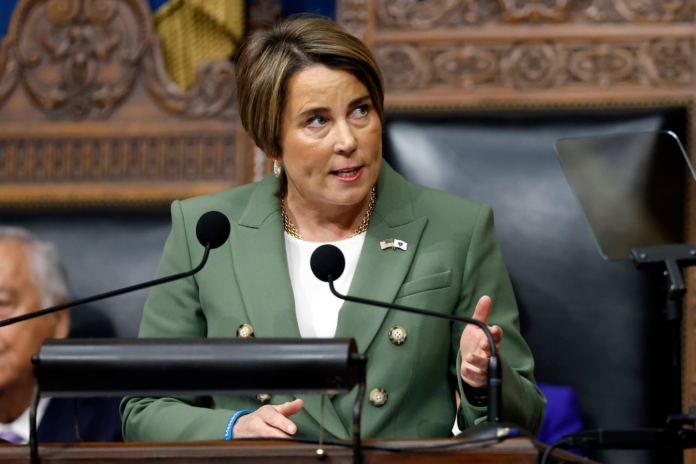In addition to her annual budget proposal, Healey aides said she will also file a separate supplemental spending plan that seeks to spend roughly $1.3 billion in surplus millionaires tax revenue, most of which would flow to the MBTA.
The spending proposal begins putting dollars behind various pledges Healey has made in recent days, including promises to bolster transportation funding and dedicate more money to construction on state college campuses . Healey seeks to accomplish these goals largely by leaning on revenue generated by the state’s so-called millionaires tax .
Governor Maura Healey on Wednesday released a $62 billion budget plan that would plow hundreds of millions of new funding into the MBTA and reshape parts of the state’s tax code to accommodate growing state spending, changes that including hiking what residents would pay for candy.
Advertisement
Overall, Healey aides said she is seeking to increase spending by 2.6 percent over the current fiscal year, not including the nearly $2 billion the plan would use in millionaires tax revenue. State officials said the proposal relies on similar levels of federal funding that the state has previously received, and does not try to estimate any potential changes the feds could make in the wake of President Trump retaking the White House.
The proposal would cover the fiscal year beginning July 1, and would need legislative approval to take effect.
Here are some of the bill’s major elements:
Tax changes
Healey, who signed a wide-ranging tax relief package in 2023, said on Tuesday she was not seeking to raise taxes while proposing to borrow billions of dollars to help fund various transit and higher education proposals.
“Hell no. No, no, no, no, no,” Healey told reporters, saying the plans called for using revenue the state already had. “I’m the CEO of the state. I gotta run the state like a business.”
Her budget, however, includes several notable changes that could mean residents are paying more in taxes, or seeing smaller tax returns. Healey is seeking to limit what taxpayers could claim under a state charitable tax deduction that was implemented in 2023 after decades of delays and is not currently capped. She is proposing to limit individual taxpayers to claims up to $5,000 and joint filers up to $10,000, changes that would save the state an estimated $164 million, according to officials.
Advertisement
Healey is also proposing to subject candy to the state sale’s tax; it’s currently exempt. The move would generate $25 million for the state, her administration estimates. Plus, her administration argues, “incentivizing” candy purchases by not subjecting it to the sales tax “does not align with our public health goals, especially for our youth.”
The budget plan would also subject synthetic nicotine products to the state’s tobacco excise tax, and close what state officials called a series of “loopholes” elsewhere in the tax code, generating roughly $145 million in new revenue for the state.
Healey aides said she is also planning to refile separate legislation next week that would allow towns and cities to raise their own local taxes on hotel stays, cars, and meals.
Millionaires tax spending
The budget plan distributes $1.95 billion the state is expecting to collect from the state’s millionaires tax, including using $275 million for daycare provider grants known as C3 grants.
Healey also wants to use $225 million of the millionaires tax revenue to fund increases to the state’s K-12 schools. In all, Healey is proposing to send $420 million more to local school districts under the state’s school funding formula, pushing school aid to $7.3 billion.
This is the first time, however, that she’s seeking to cover increased spending for K-12 aid through the millionaires tax.
The budget would also keep funding for other initiatives, including universal free meals in the state’s schools and to allow every resident to attend a Massachusetts community college tuition-free.
Advertisement
The governor’s budget also would send $500 million in millionaires tax revenue to the MBTA, nearly quadrupling the state subsidy it got in this year’s budget. Combined with another $780 million Healey wants to dedicate to the T from the millionaires tax, the transit agency would see a nearly $1.3 billion infusion on top of the share of the state’s sales tax it already collects.
Shelter and housing
One of the key savings proposals Healey’s office highlighted in the budget was making cuts to what residents could collect under an assistance program for families facing eviction — just months after a state commission recommended to continue supporting the program amid Massachusetts’ housing crisis.
Healey is seeking to change how much money families can receive through the Residential Assistance for Families in Transition, or RAFT, program, which helps provide funds to struggling families to prevent them from being evicted. The budget calls to change what a family can receive from its current rate of $7,000 over a 12-month period to $7,000 over 24 months. Officials said the change could save the state $40 million.
Massachusetts’ commission on Emergency Housing Assistance Programs in the fall recommended the state should emphasize prevention, diversion, and exit tools, pointing to RAFT as one such program that can “help families avoid harmful and destabilizing evictions.”
That suggestion was one of several that the commission issued in November to tackle the $1 billion emergency housing system’s heightened costs, driven in part by a surge of migrants coming into Massachusetts.
Advertisement
Healey is proposing to give the same amount of funding for the state’s emergency shelter system — $325 million — as in previous years, though Healey’s budget chief acknowledged the state would likely have to again seek more money later in the year to keep the program funded.
Healey earlier this month sought a series of changes to the state’s right-to-shelter law that, combined with a proposal to limit families to six months in shelters, officials hope will drive down costs below the $1 billion the state is expected to spend this year on the system.
Matt Stout can be reached at matt.stout@globe.com. Follow him @mattpstout. Anjali Huynh can be reached at anjali.huynh@globe.com.


